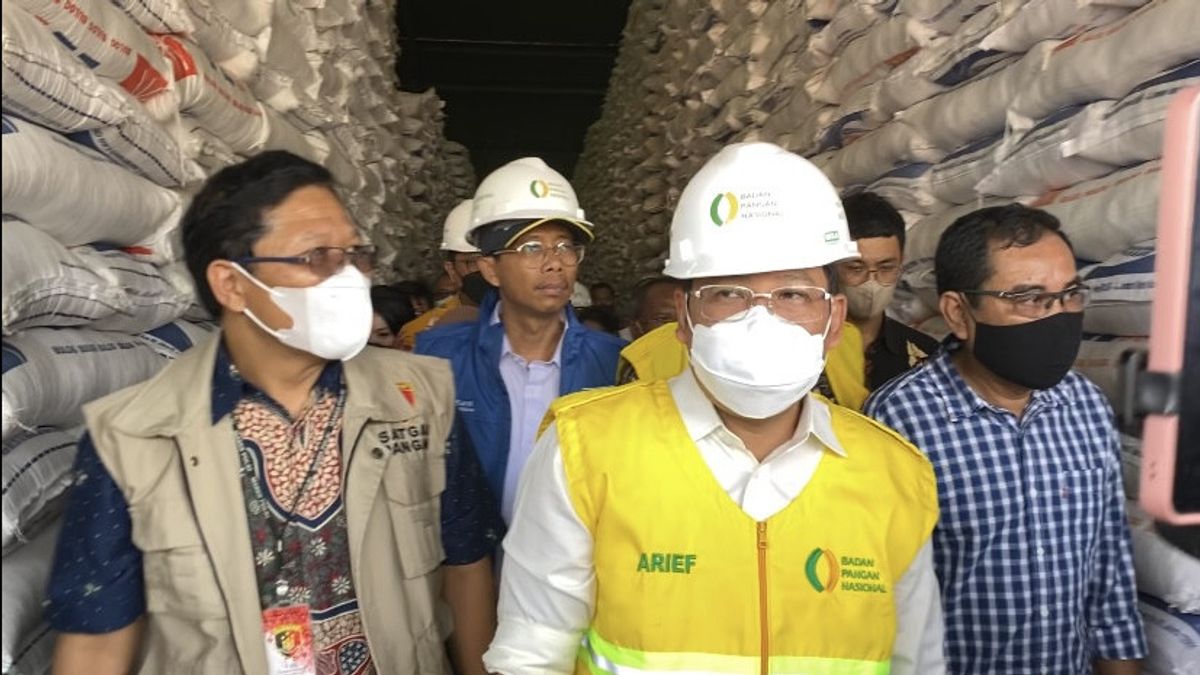JAKARTA The surge in demand and consumption on the National Religious Holidays (HBKN) of Ramadan and Eid al-Fitr has the potential to encourage an increase in food prices.
Therefore, the National Food Agency has implemented a number of strategic steps to control food inflation. One of them is opening the import tap.
Head of the National Food Agency Arief Prasetyo Adi said that food is one of the sectors that has a significant contribution to the movement of the national inflation rate, so that strategic steps to control food inflation ahead of the HBKN Ramadan and Eid al-Fitr must be a priority and be executed properly.
"We have prepared a number of steps and some have been carried out, especially regarding efforts to control rice prices considering that based on data from the Central Statistics Agency (BPS), rice is a food commodity that contributes to inflation in February 2023," he said, in Jakarta, Friday, March 3.
Arief emphasized that controlling rice prices is the key to maintaining food inflation ahead of HBKN.
Efforts to mitigate rice price control continue to be carried out even though entering the main harvest, rice prices have fallen.
"We continue to take mitigation steps and control rice prices, including through the Stabilization of rice supply and price (SPHP) at the consumer level which is still running. Until March 1, Bulog has distributed around 413,000 tons of rice for SPHP activities," he said.
In addition, said Arief, Badanas is also carrying out steps to ensure that Bulog's absorption of grain/rice runs optimally at this March-April harvest.
Preparations were made by setting an upper limit on the purchase of grain/rice, discussing the Purchase Price of the Government (HPP) of grain/rice and the Highest Retail Price (HET) of Rice, and increasing Bulog's collaboration with milling business actors.
"This must really be prepared to maintain the balance of the national expansion ecosystem, and ensure that Bulog can absorb it to fill the Government Rice Reserve (CBP) according to the target, so that the government has instruments to control prices," he said.
This rice price control step, said Arief, is in line with the direction of President Joko Widodo (Jokowi) who reminded the relevant ministries/agencies and local governments to be careful of rice prices because they have a big contribution to inflation.
Open Import Faucet
In addition to maintaining rice price stability, Arief added, food inflation control is also carried out by ensuring food availability, especially for strategic food commodities that need to be met from outside, such as ruminant meat and consumption sugar in preparation for Ramadan 2023.
"For beef and buffalo and consumption sugar, we have assigned Bulog and asked the Ministry of SOEs to assign Food SOEs to procure," he said.
Arief explained, for the ID FOOD ruminansia meat, around 100,000 tons of beef and Bulog will procure around 100,000 tons of buffalo meat.
"Arrivals are carried out in stages, we will accelerate (its arrival) before Lebaran to increase stock and maintain meat prices in the community," he explained.
Likewise with consumption sugar, in the first phase until May 2023, SOE Food ID FOOD and PTPN Holding Plantation are tasked with procuring around 215,000 tons of White Crystal Sugar (GKP).
In controlling inflation ahead of the HBKN, Badanas also made efforts to stabilize supply and price of cooking oil by distributing bulk cooking oil and cooking oil packaged by Oilita through the Food SOE ID FOOD. As of March 1, 2023, ID FOOD has distributed a total of 11 million liters to 27 provinces.
Furthermore, Arief added, Badanas also ensures that the implementation of Food Distribution Facilities (FDP) and market operations or the Cheap Food Movement (GPM) will continue to be carried out throughout the HBKN or ahead of Ramadan to Eid al-Fitr.
"The closer the H day the intensity will be increased. We encourage Market Operations or the Cheap Food Movement to be carried out in 38 provinces and 514 regencies/cities in Indonesia through collaboration with the Food Affairs Service in all provinces and regencies/cities in Indonesia," he said.
Hold Market Operations
Until the end of entering this March, Arief said, many provinces had carried out market operations or GPMs, such as Gorontalo, West Java, Central Java, Jambi, Maluku, Central Sulawesi, West Sumatra, North Sulawesi, Aceh, NTB, and NTT.
The implementation of the GPM is the result of the collaboration between the Ministry and related institutions, the National Police Food Task Force, Bank Indonesia, the Office of Food Affairs throughout Indonesia, BUMN, BUMD, Association, and other stakeholders. In this activity, 9 strategic foodstuffs are provided at a reasonable price or below market prices.
"Through this GPM activity, we increase people's affordability and purchasing power," he said.
Meanwhile, based on data released by BPS, the national inflation rate in February 2023 was recorded at 0.16 percent on a monthly basis, or decreased from inflation in January 2023 which was at 0.34 percent.
For food commodities, rice gave the highest contribution of 0.08 percent, followed by shallots of 0.03 percent and red chilies of 0.02 percent.
The English, Chinese, Japanese, Arabic, and French versions are automatically generated by the AI. So there may still be inaccuracies in translating, please always see Indonesian as our main language. (system supported by DigitalSiber.id)













